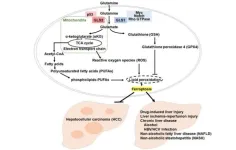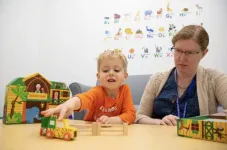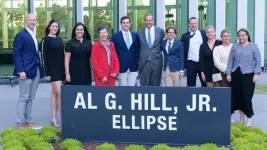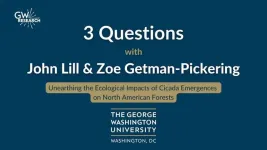(Press-News.org) Recognizing the many milestones it has reached in recent months, Strategies to Prevent Spillover, or STOP Spillover, a project funded by the U.S. Agency for International Development (USAID) and led by Tufts University, has announced that the interim leadership team that was put in place in March 2023 will take on a permanent role for the next two years of the project.
Hellen Amuguni, an associate professor in the Department of Infectious Disease and Global Health at Cummings School of Veterinary Medicine, is the new project director. The co-deputy directors are Felicia Nutter, director of the International Veterinary Medicine Program at Cummings School, and Jonathon Gass, an assistant professor of infectious disease epidemiology at the School of Medicine. (Amuguni and Nutter have secondary appointments at Tufts University School of Medicine, and Gass has a secondary appointment at Cummings School.)
“We are entering the fourth year of STOP Spillover on a high note, and our vision for the project remains clear,” says Amuguni. “Our focus is to build capacity and prepare countries to identify high-risk interfaces, control zoonotic diseases at their source before they become epidemics or pandemics, and develop interventions that reduce risks of exposure in human populations. We are privileged to work closely with amazing country teams and government counterparts as well as our consortium partners who bring expertise in wildlife health, infectious diseases, social and behavior change.”
At least 75 percent of emerging and re-emerging infectious diseases of humans—including Ebola, Nipah virus, and zoonotic avian flu—have an animal origin. Chances are that when the next illness like COVID-19 emerges to threaten global health, it will originate in animals before it passes to humans, a process known as spillover. STOP Spillover aims to keep that tipping point from happening, or at least mitigate the dangerous effects.
“STOP Spillover has achieved so much in its third year thanks to these directors, who have been working with stakeholders in key countries in Africa and Asia to find ways to decrease the risks of harmful viral pathogens that jump—or spill over—from animals to humans,” said Caroline Genco, Tufts’ provost and senior vice president, who is also an immunologist. “Through this important work, our expert researchers and community partners demonstrate our shared commitment to One Health as a way of mitigating the significant global risk represented by zoonotic disease spillover.”
Leading a Global Consortium of Regional Partners
Begun in late 2020, STOP Spillover has so far partnered with colleagues in Bangladesh, Cambodia, Côte d’Ivoire, Liberia, Uganda, Viet Nam, and Sierra Leone to strengthen country capacities to reduce the risks of zoonotic diseases, or those that move between animals and humans. Teams of experts collaborate to develop country- and locality-specific research studies and interventions to reduce risks associated with selected viral zoonotic pathogens and to prevent their spread.
USAID administers the U.S. foreign assistance program providing economic and humanitarian assistance in more than 80 countries worldwide. For this project, Tufts leads a global consortium of partners with cross-disciplinary experience and regional knowledge.
From the outset, this consortium of experts in human, animal, and environmental health has been heavily focused on engagement, working with stakeholders at the national, regional, and local levels to reduce risks of exposure to and mitigate the spread of selected zoonotic viral pathogens, including coronaviruses, filoviruses (Ebola and Marburg viruses), avian influenza, and Lassa virus, among others.
Protecting Health and Providing Financial Stability
On the ground at the local level—in places such as wildlife farms in Dong Nai province, Vietnam, and wild animal meat markets in Kenema, Sierra Leone—community-led workshops have provided important data about the interactions humans have with wild and domestic animals in these settings, as well as the barriers they see to behavior changes that reduce spillover risk.
Gass, who recently visited wildlife farms in Viet Nam with its in-country team, said that STOP Spillover is filling major gaps in understanding the spillover ecosystem, which will improve conditions for both animals and humans.
Gass noted that wildlife farmers, government officials, and other stakeholders are very interested in working together to increase biosafety. “Farming practices are critical for the financial livelihoods of farmers and their families,” he said. “When outbreaks occur on farms and the animals either die or need to be culled, this has serious financial repercussions. STOP Spillover’s interventions will not only protect health but also provide increased financial stability via risk reduction.”
The program has formed local expert working groups to identify places where spillover is most likely to occur and to design risk-reduction interventions. In Liberia, for example, STOP Spillover is conducting research to understand Lassa virus distribution in rodent reservoir hosts both within what is considered the “Lassa belt” and beyond. Working with the Ministry of Health, National Public Health Lab, the Ministry of Agriculture, and local communities, teams are collecting and testing samples from the African soft-furred mouse and other rodents for the presence of Lassa virus RNA (an indication of infection) within and outside of the Lassa belt.
The documentation of the true distribution of Lassa virus in reservoir hosts will allow the country to better understand the risks to humans, develop more effective rodent control strategies, and inform future research, policy, and public health measures.
Technology and Space Redesign for Biosafety
At live bird markets in Dhaka, Bangladesh, where the threat of highly pathogenic avian influenza is a concern, efforts are underway to develop a coordinated and sustainable platform for pathogen surveillance and data sharing. A mobile application has been developed, enabling the public to report sick and dead poultry as well as sudden febrile illness among market vendors. Moreover, the STOP Spillover team is working with public health experts and engineers to redesign market spaces so that biosafety is optimized, and consumer and vendor health protected.
In Côte d’Ivoire, Cambodia, and Liberia, teams have been trained to safely collect samples for surveillance of wastewater and liquid waste effluent, with potential testing for multiple zoonotic viruses. The aim is to create a surveillance system that can act as an “early warning system” for potential spillover events.
The program exemplifies the One Health concept: the interconnection of human, animal, and environmental health. “STOP Spillover continues the longstanding work of Tufts University, mainstreaming One Health approaches to address complex, globally important health problems, including zoonotic diseases,” said Felicia Nutter.
“Humans make choices every day that impact our health, the health of other animals, and the ecosystems and environments that we all share. Our current work empowers people to make more informed choices that safeguard our shared health,” said Nutter.
END
Pandemic prevention consortium announces new leadership team
STOP Spillover is strengthening our capacity to reduce the risks of emerging pathogens
2023-10-19
ELSE PRESS RELEASES FROM THIS DATE:
mRNA delivered by extracellular vesicles induces immunotherapy response in glioblastoma
2023-10-19
HOUSTON ― A team of researchers at The University of Texas MD Anderson Cancer Center has developed a new method for using extracellular vesicles to enhance responses to immunotherapy in glioblastoma, potentially opening the door for wider use of engineered messenger RNA (mRNA) for cancer therapy. The study was published today in Nature Communications.
Earlier this year, a team of researchers led by Betty Kim, M.D., Ph.D., and Wen Jiang, M.D., Ph.D.,developed a novel method for loading mRNA into extracellular vesicles, small structures created by cells to transport biomolecules and nucleic acids within ...
Point-of-care technology initiative awarded $8.9 million renewal
2023-10-19
UMass Chan and UMass Lowell’s point-of-care technology initiative awarded $8.9 million renewal
UMass Chan Medical School and UMass Lowell have received an $8.9 million award from the National Institutes of Health (NIH) for renewed support of their initiative to advance the development of home-based and point-of-care health technologies. The program aims to jumpstart new tools to address heart, lung, blood and sleep disorders, especially in underserved populations.
The Center for Advancing Point of Care Technologies ...
GLS2 shapes ferroptosis in hepatocellular carcinoma
2023-10-19
“[...] we hope that our findings will inform future decisions regarding treatment of liver disease.”
BUFFALO, NY- October 19, 2023 – A new editorial paper was published in Oncotarget's Volume 14 on October 19, 2023, entitled, “GLS2 shapes ferroptosis in hepatocellular carcinoma.”
In their new editorial, researchers Sawako Suzuki, Divya Venkatesh, Tomoaki Tanaka, and Carol Prives from Columbia University discuss ferroptosis regulation of GLS2 as a potential therapeutic strategy against liver diseases.
“More than a decade has passed since our group (1) as well as ...
Groundbreaking study on bilingual children with Developmental Language Disorder
2023-10-19
Amanda Owen Van Horne sits on the floor while a child mixes up cake batter in a play kitchen.
While at play, an intensive language therapy program is also underway for preschool-aged children with developmental language disorder (DLD) at the University of Delaware’s Treatment Efficacy and Learning Language (TELL) Lab. The child says, “Him cooking.” Owen Van Horne repeats back, “He is cooking.”
DLD is a problem with learning and using language not attributed to a hearing impairment or intellectual disability, according to DLD ...
The Trinity Family Foundation grants major gift to Center for BrainHealth to honor the memory of Al G. Hill, Jr.
2023-10-19
The Trinity Family Foundation has pledged a generous $4 million gift to the Center for BrainHealth to advance the science of brain health, in memory of Al G. Hill, Jr., a renowned Dallas entrepreneur and philanthropist.
The thoughtful investment will support burgeoning research at the Center for BrainHealth, focused on deepening our understanding of neuroplasticity – the brain’s lifelong ability to change, adapt, get stronger and work better.
In recognition and gratitude, the center’s ...
Research shows new documentation tool could help optimize seizure treatments in patients with epilepsy
2023-10-19
New research from the University of Colorado Anschutz Medical Campus studies a new tool that will help medical providers identify patients who are failing epilepsy treatments earlier in order to change treatment to rapidly optimize positive outcomes.
The study was published online today in Neurology® Clinical Practice, an official journal of the American Academy of Neurology.
The study was a quality improvement project that tested the implementation of an easy-to-use standardized electronic health record documentation tool, which dramatically improved the accuracy and completeness of important clinical documentation ...
Neuroscientists to reveal new insights into Alzheimer’s
2023-10-19
Dementia experts from UC San Francisco will join their peers from around the globe at the annual Clinical Trials on Alzheimer’s Disease (CTAD) conference in Boston from Oct. 24 to 27.
Presentations cover breakthroughs in therapies that clear amyloid – a hallmark of Alzheimer’s – and a symposium on patients with early Alzheimer’s symptoms who were treated with the anti-amyloid medication donanemab, which may be approved by the end of the year. Other topics include novel treatments, diagnostic blood biomarkers, amyloid-related imaging abnormalities (ARIA) and Medicare coverage.
This year’s ...
New study finds racial and ethnic disparities persist in access to chiropractic care and physical rehabilitation for adults with low back pain
2023-10-19
BOSTON - Low back pain is the leading cause of disability worldwide and a major driver of healthcare costs in the United States, according to the World Health Organization. Over the last 20 years, recommended treatment of low back pain has shifted from use of pain medications including opioids to early use of nonpharmacologic treatments such as spinal manipulation and therapeutic exercise which are commonly provided by chiropractors and physical therapists. However, while nearly all Americans will experience back pain at some point in their lives, most Americans ...
Record-breaking fast radio burst offers path to weigh the Universe
2023-10-19
In a paper published today in Science, a global team led by Macquarie University’s Dr Stuart Ryder and Swinburne University of Technology’s Associate Professor Ryan Shannon, report on their discovery of the most ancient and distant fast radio burst located to date, about eight billion years old.
The discovery smashes the team’s previous record by 50 per cent. It confirms that fast radio bursts (FRBs) can be used to measure the “missing” matter between galaxies.
The source of the burst was shown to be a group of two or three galaxies that are ...
Unearthing the ecological impacts of cicada emergences on North American forests
2023-10-19
WASHINGTON (October 19, 2023) – Every 13 or 17 years, billions of cicadas emerge from the ground to reproduce in eastern North American deciduous forests. One of the largest emergence events of these insects happened in 2021 when theBrood X cicadas emerged. Researchers who studied that once-in-a-generation event are now unveiling the impact this occurrence had on forest ecosystems, specifically on birds, caterpillars and trees.
In a new study published today in Science, researchers at the George Washington University, Georgetown University and the University of Maryland quantified the widespread ...
LAST 30 PRESS RELEASES:
Insufficient sleep among US adolescents across behavioral risk groups
Long COVID and recovery among US adults
Trends in poverty and birth outcomes in the US
Heterogeneity of treatment effects of GLP-1 RAs for weight loss in adults
Within-person association between daily screen use and sleep in youth
Low-dose lithium for mild cognitive impairment
Catheter ablation and oral anticoagulation for secondary stroke prevention in atrial fibrillation
A new theory of brain development
Pilot clinical trial suggests low dose lithium may slow verbal memory decline
Bioprinting muscle that knows how to align its cells just as in the human body
A hair-thin fiber can read the chemistry of a single drop of body fluid
SwRI develops magnetostrictive probe for safer, more cost-effective storage tank inspections
National report supports measurement innovation to aid commercial fusion energy and enable new plasma technologies
Mount Sinai, Uniformed Services University join forces to predict and prevent diseases before they start
Science of fitting in: Do best friends or popular peers shape teen behavior?
USF study: Gag grouper are overfished in the Gulf; this new tool could help
New study from Jeonbuk National University finds current climate pledges may miss Paris targets
Theoretical principles of band structure manipulation in strongly correlated insulators with spin and charge perturbations
A CNIC study shows that the heart can be protected during chemotherapy without reducing antitumor efficacy
Mayo Clinic study finds single dose of non-prescribed Adderall raises blood pressure and heart rate in healthy young adults
Engineered immune cells show promise against brain metastases in preclinical study
Improved EV battery technology will outmatch degradation from climate change
AI cancer tools risk “shortcut learning” rather than detecting true biology
Painless skin patch offers new way to monitor immune health
Children with poor oral health more often develop cardiovascular disease as adults
GLP-1 drugs associated with reduced need for emergency care for migraine
New knowledge on heritability paves the way for better treatment of people with chronic inflammatory bowel disease
Under the Lens: Microbiologists Nicola Holden and Gil Domingue weigh in on the raw milk debate
Science reveals why you can’t resist a snack – even when you’re full
Kidney cancer study finds belzutifan plus pembrolizumab post-surgery helps patients at high risk for relapse stay cancer-free longer
[Press-News.org] Pandemic prevention consortium announces new leadership teamSTOP Spillover is strengthening our capacity to reduce the risks of emerging pathogens







